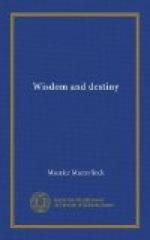55. Within reach of all, demanding neither boldness nor energy, is this “enchantment of the disenchanted!” But what name shall we give to the man who renounces that which brought happiness to him, and rather would surely lose it to-day than live in fear lest fortune haply deprive him thereof on the morrow? Is the mission of wisdom only to peer into the uncertain future, with ear on the stretch for the footfall of sorrow that never may come—but deaf to the whirr of the wings of the happiness that fills all space?
Let us not look to renouncement for happiness till we have sought it elsewhere in vain. It is easy to be wise if we be content to regard as happiness the void that is left by the absence of happiness. But it was not for unhappiness the sage was created; and it is more glorious, as well as more human, to be happy and still to be wise. The supreme endeavour of wisdom is only to seek in life for the fixed point of happiness; but to seek this fixed point in renouncement and farewell to joy, is only to seek it in death. He who moves not a limb is persuaded, perhaps, he is wise; but was this the purpose wherefor mankind was created? Ours is the choice— whether wisdom shall be the honoured wife of our passions and feelings, our thoughts and desires, or the melancholy bride of death. Let the tomb have its stagnant wisdom, but let there be wisdom also for the hearth where the fire still burns.
56. It is not by renouncing the joys that are near us that we shall grow wise; but as we grow wise we unconsciously abandon the joys thatt now are beneath us. Even so does the child, as years come to him, give up one by one without thinking the games that have ceased to amuse. And just as the child learns far more from his play than from work that is given him, so does wisdom progress far more quickly in happiness than in misfortune. It is only one side of morality that unhappiness throws into light; and the man whom sorrow has taught to be wise, is like one who has loved and never been loved in return. There must always be something unknown to the love whereto no other love has made answer; and this, too, will remain unknown to him whose wisdom is born of sorrow.
“Is happiness truly as happy as people imagine?” was asked of two happy ones once by a philosopher whom protracted injustice had saddened. No; it is a thing more desirable far, but also much less to be envied, than people suppose; for it is in itself quite other than they can conceive who have never been perfectly happy. To be gay is not to be happy, nor will he who is happy always be gay. It is only the little ephemeral pleasures that forever are smiling; and they die away as they smile. But some loftiness once obtained, lasting happiness becomes no less grave than majestic sorrow. Wise men have said it were best for us not to be happy, so that happiness thus might be always the one thing desired. But how shall the sage, to whom happiness




